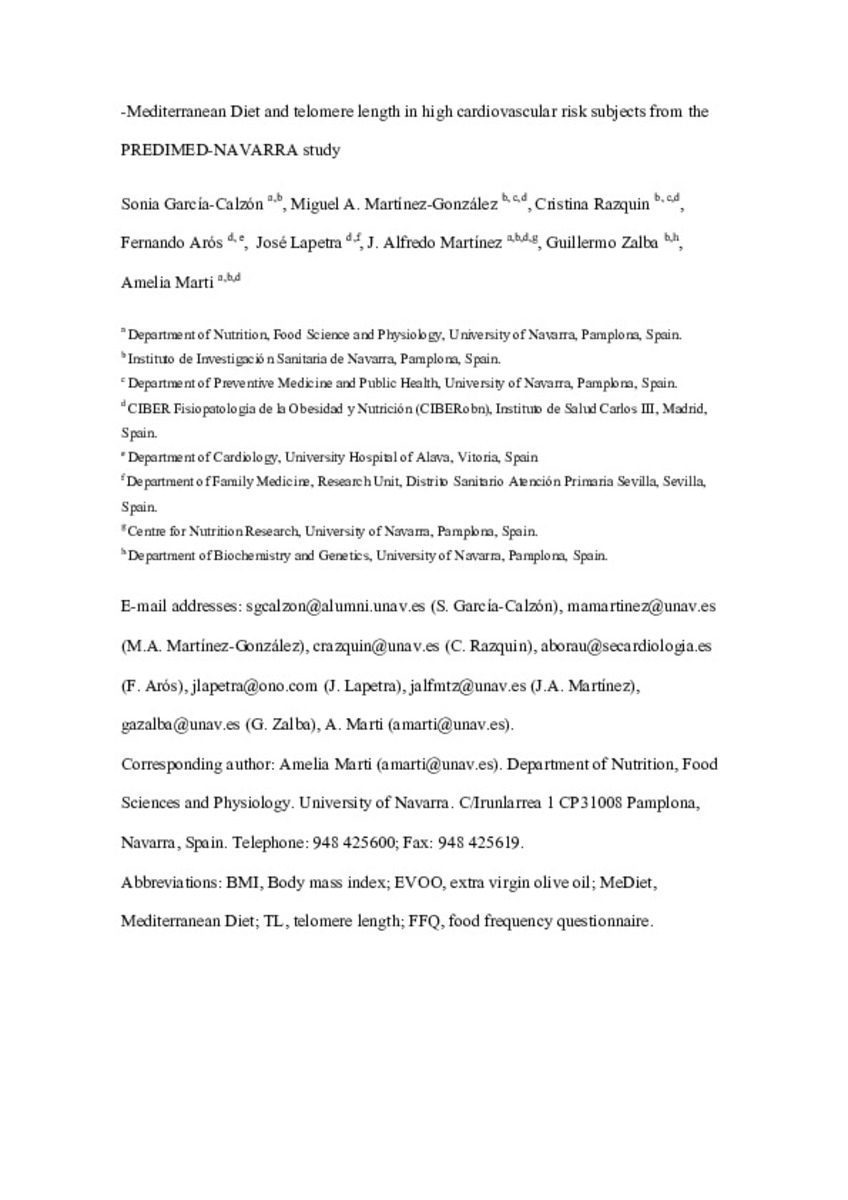Full metadata record
| DC Field | Value | Language |
|---|---|---|
| dc.creator | Garcia-Calzon, S. (Sonia) | - |
| dc.creator | Martinez-Gonzalez, M.A. (Miguel Ángel) | - |
| dc.creator | Razquin, C. (Cristina) | - |
| dc.creator | Aros, F. (Fernando) | - |
| dc.creator | Lapetra, J. (José) | - |
| dc.creator | Martinez, J.A. (José Alfredo) | - |
| dc.creator | Zalba, G. (Guillermo) | - |
| dc.creator | Marti-del-Moral, A. (Amelia) | - |
| dc.date.accessioned | 2017-03-30T10:46:53Z | - |
| dc.date.available | 2017-03-30T10:46:53Z | - |
| dc.date.issued | 2016-12 | - |
| dc.identifier.citation | Garcia-Calzon S, Martínez-González MA, Razquin C, Aros F, Lapetra J, Martinez JA, et al. Mediterranean diet and telomere length in high cardiovascular risk subjects from the PREDIMED-NAVARRA study. Clin Nutr. 2016:1-33. | es_ES |
| dc.identifier.issn | 0261-5614 | - |
| dc.identifier.uri | https://hdl.handle.net/10171/43193 | - |
| dc.description.abstract | Summary Background & aims A healthy lifestyle has been associated with longer telomeres, but whether Mediterranean Diet (MeDiet) affect telomere length (TL) has not been fully elucidated yet. Our aim was to assess the relationship between MeDiet and TL in high cardiovascular risk subjects in the context of a randomized nutritional intervention trial. Methods We assessed 520 participants (55–80 years, 55% women) from the PREDIMED-NAVARRA trial. Leukocyte TL was measured by qPCR at baseline and after 5 years of a dietary intervention program where subjects were randomly assigned to a low-fat control diet or to two MeDiets, one supplemented with extra virgin olive oil (MeDiet-EVOO) and the other with mixed nuts (MeDiet-nuts). A validated 14-item questionnaire was used to appraise baseline adherence of participants to the MeDiet. Results Better adherence to MeDiet (as appraised by the 14-item score) was associated with longer basal telomeres in women in the baseline cross-sectional analysis, whereas the opposite was observed in men (P interaction = 0.036). Female subjects who scored 10 points had longer basal telomeres (0.27, 95% CI: 0.03–0.52) than women scoring ≤6 points at the beginning of the study (−0.46, 95% CI: −0.85 to −0.7) (P = 0.003). However, allocation to the MeDiet-nuts group (−0.24, 95% CI: −0.38 to −0.01) was associated with a higher risk of telomere shortening after 5 years of intervention, whereas no differences were found for the MeDiet-EVOO group (0.14, 95% CI: 0.02–0.27), in comparison with the Control group (0.07, 95% CI: −0.08 to 0.23) (P = 0.003 and P = 0.537, respectively). Conclusion A greater baseline adherence to a Mediterranean dietary pattern was associated with longer telomeres only in women. No beneficial effect of the intervention with the MeDiet for the prevention of telomere shortening in comparison with a low-fat diet was observed. | es_ES |
| dc.language.iso | eng | es_ES |
| dc.publisher | Elsevier | es_ES |
| dc.rights | info:eu-repo/semantics/openAccess | * |
| dc.subject | Mediterranean diet | es_ES |
| dc.subject | Nutrition | es_ES |
| dc.subject | Telomere | es_ES |
| dc.subject | Aging | es_ES |
| dc.subject | Intervention | es_ES |
| dc.subject | Materias Investigacion::Ciencias de la Salud::Nutrición y dietética | es_ES |
| dc.title | Mediterranean diet and telomere length in high cardiovascular risk subjects from the PREDIMED-NAVARRA study | es_ES |
| dc.type | info:eu-repo/semantics/article | es_ES |
| dc.description.note | Creative Commons Attribution Non-Commercial No Derivatives License | es_ES |
| dc.identifier.doi | http://dx.doi.org/10.1016/j.clnu.2016.03.013. | es_ES |
Files in This Item:
Statistics and impact
Items in Dadun are protected by copyright, with all rights reserved, unless otherwise indicated.






